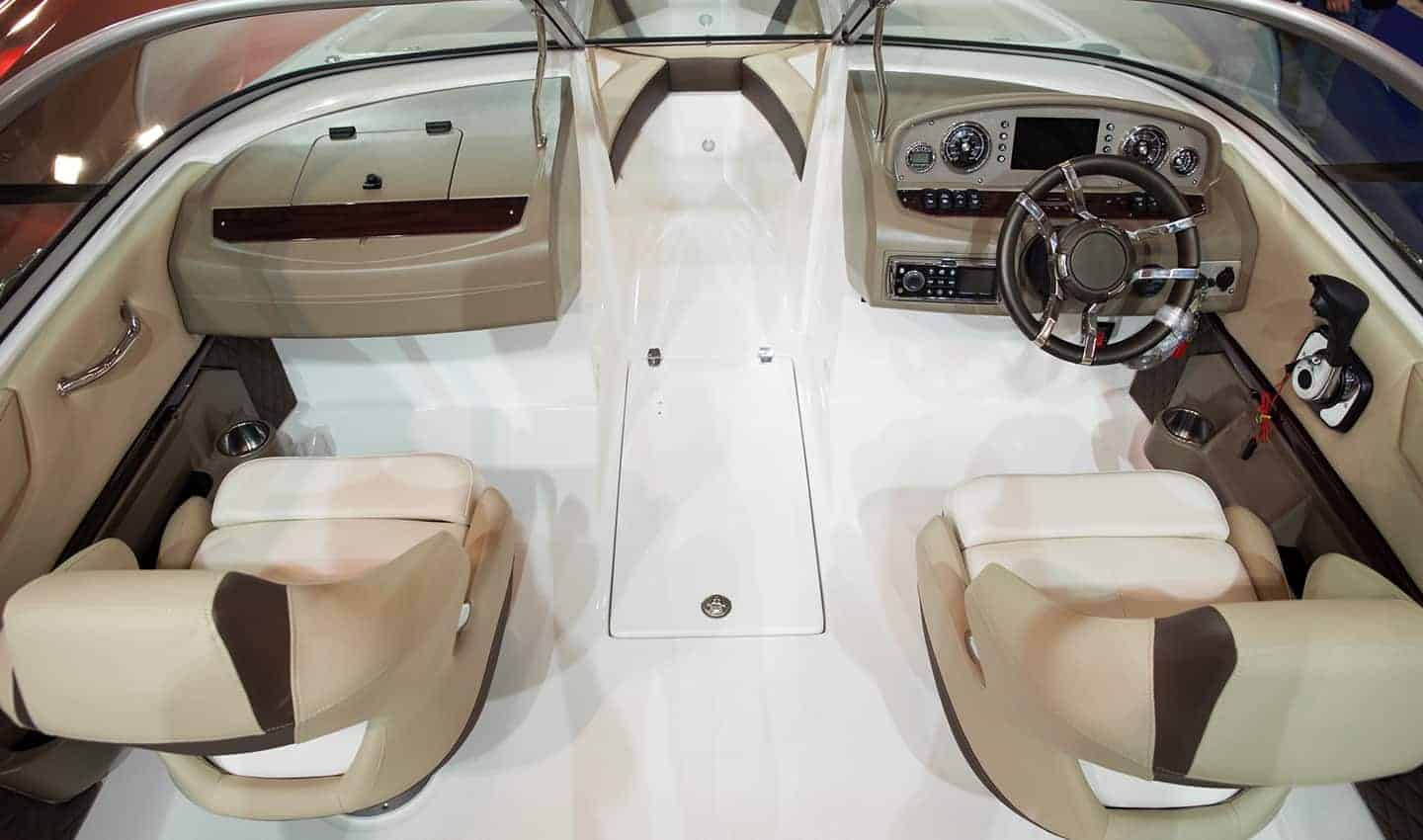Boat Flooring: A Detailed Overview and Buyer’s Guide

The flooring of your boat can make a distinctive difference to the type of boating experience you have each time you take your pride and joy out on the water. It can also extend the longevity of your boat, depending on what you use yours for.
When it comes down to it, the actual function of your boat determines the type of boat flooring it should have. But with so many different boats and flooring types on the market today, how do you decide which is best?
This boat flooring guide is here to help. Check out the rest of this blog for various types of boat flooring to choose from and the pros and cons of each.
1. Marine Carpet Flooring
One of the most popular types of boat flooring materials used today is marine carpeting. But bear in mind that this flooring option is not suited to all types of boating pursuits.
Marine carpet has been around for a good few decades already, and is quite similar to the hardy carpeting that is used many households. This being said, technological advances have paved the way for new carpet materials that can withstand the elements while boating.
Marine carpeting is far more durable and water-resistant than regular carpeting, though it feels much the same. The carpeting you find on boats is made from synthetic materials and you have your choice of colors, styles, and textures to suit the aesthetic of your vessel.
Some of the pros of marine carpet include:
- It’s inexpensive and probably the cheapest type of flooring for your vessel
- It’s soft and comfortable
- It offers plenty of traction which helps you to stabilize yourself on a moving boat, especially when your feet are wet
- It looks appealing and can make for a great finish for the both exterior and interior of boats
Some of the cons include:
- As water-resistant as marine carpet is, it still soaks up moisture which can cause rotting over time
- It’s absorbent to odors, so over time your carpet can begin to smell bad which can be very off-putting
Marine carpet is best-suited to pontoon boats, the interior of yachts, and large speed boats. However, it’s not ideal for fishing boats due to the absorbent nature of the material and the smell that goes with it.
Marine carpeting generally sits on top of a plywood floor. If you choose this type of material, it’s important to maintain it correctly otherwise rot can damage the plywood underneath.
2. Aluminum Boat Flooring
Another top choice for flooring material is aluminum. This type of flooring is particularly popular with pontoon boats and fishing boats. It’s a brilliant option because aluminum is lightweight and durable. This means that is won’t weigh your boat down and chew into your fuel consumption.
Some of the pros of aluminum marine flooring are:
- It’s low maintenance and highly durable
- The cost to install aluminum flooring is inexpensive — it may not be as cheap as marine carpet, but it’s still highly affordable
- It also offers pretty decent traction to help you find stability on a moving boat
Some of the cons include:
- The noise factor — aluminum can sound fairly ”tinny” when walking on it with shoes, but for concerned fishermen, wearing flip flops solves this problem!
- Aesthetic appeal — it’s not the ”’prettiest” type of boat flooring on the market today, but it does the job
Aluminum flooring does require a bit of maintenance, too. It’s important to thoroughly rinse the floor with fresh water and detergent if you’ve been out in salt water. Bear in mind that if you keep your boat on the water in winter, you may have to contend with an ice layer on the surface.
3. Rubber Marine Flooring
What rubber marine flooring lacks in aesthetic appeal, it makes up for with many other positive qualities. Sure, it may not be the best looking type of flooring, but rubber is a good option for many other reasons.
It’s the type of marine material that can stand the test of time, and offers these other great benefits:
- It’s completely slip resistant, which offers stability, boat safety, and peace-of-mind while out on the open water
- It also inexpensive — compared to other marine flooring materials, it’s on the cheap side
- It’s comfortable — rubber flooring consists of anti-fatigue properties, meaning that it remains both soft and supportive over time
Some of the cons of rubber flooring include:
- It’s not UV-resistant — this means that the flooring is bound to fade over time and might even crack if not replaced often enough
- Rubber flooring traps heat, meaning it can get very hot underfoot after a long day in the sun
If you don’t like the look of plain marine rubber, you can find rubber flooring in an assortment of different colors and textures, just bear in mind that this comes at an extra cost.
4. Vinyl Marine Flooring
This is probably one of the most common types of marine flooring you’ll find in larger boats today, such as pontoons, yachts, and ski-boats. However, it’s important to note that vinyl boat flooring is not the same as household vinyl flooring.
Over the years, there have been plenty developments in the look, feel, and function of vinyl as a flooring option. Here are some of the standout pros:
- It requires little maintenance and is very durable — it’s easy to clean and can withstand plenty of traffic and all types of weather conditions
- It’s waterproof and creates a waterproof seal due to the fact that it’s glued down to the boat’s frame
- Vinyl is soft and comfortable — you can make it even softer by installing padding underneath it
- It’s resistant to sound — making it a great option for fishing enthusiasts
- Vinyl is UV-resistant, meaning it won’t fade, warp, crack, or discolor over time
- It offers longevity and good bang-for-your-buck
The cons of vinyl marine flooring include:
- It’s costly — yes, it will set you back a few more pennies, but the reality is that you get what you pay for and you won’t be sorry
- Vinyl has a tendency to overheat, much like marine rubber flooring
If have the budget, you can invest in a type of vinyl flooring called Marine SeaGrass. Its light color means it does not absorb heat like other shades of vinyl flooring. But, you’ll have to pay a little extra for this, of course.
One of the best products for cleaning vinyl flooring is Star Brite Non-Skin Deck Cleaner. You can clean vinyl flooring with a high pressure washer too, but just make sure you let it dry out thoroughly to avoid mold growth.
5. PVC Boat Flooring
While PVC is not a very common type of boat flooring, it still delivers as a high-quality option. PVC, or polyvinyl chloride boat flooring is available in the form of tiles that are fixed together like puzzle pieces across your boat frame/deck.
PVC flooring is highly durable, user-friendly, and includes these other benefits:
- It’s low-maintenance — this type of material is designed for garages and other high-impact areas, so you know it can stand the test of time
- It’s 100 percent waterproof and will not absorb moisture, odors, or grow mold
- PVC is unbreakable and durable — it can withstand constant exposure to moisture
- PVC tiles are impermanent — because they are not glued to your deck, you can remove them at any time and replace your flooring if you please
Some of the cons of PVC flooring include:
- The cost — PVC is on the pricier end of the spectrum, but as mentioned before, you get your money’s worth with these types of robust materials
- PVC flooring is not UV-resistant, either — it’s likely to fade over time if you do not use a boat covering
Remember that PVC flooring is multi-functional.
You don’t have to use these tiles on your boat forever if they are not working for you. You can remove them and use your PVC tiles to protect another surface/flooring in your home, garage, outdoor or storage areas. So either way, it’s not a waste to invest in them!
They also come in a number of color options. Be sure to choose the most neutral color if you plan on using these PVC tiles for any other function, besides boat flooring.
Brush Up on Your Knowledge With Boating Scout
When it comes time to choose your boat flooring, you’ll need to carefully consider what you use your boat for. It’s also wise to think about how often you take it out, where it’s stored, and the overall look and feel of your vessel.
We hope this guide has offered some insight into the best type of marine flooring for your specific needs.
If you’re interested in learning more about boating, whether it’s boat types, the cost of boat ownership, how to buy a boat, and more, Boat Scout has got you covered. Explore our website for your fix of boating knowledge.
This article may contain affiliate links which I earn a commision through when you purchase. As an Amazon Associate I earn from qualifying purchases.
Please read why I do this and my commitment to accurate and compelling content.


